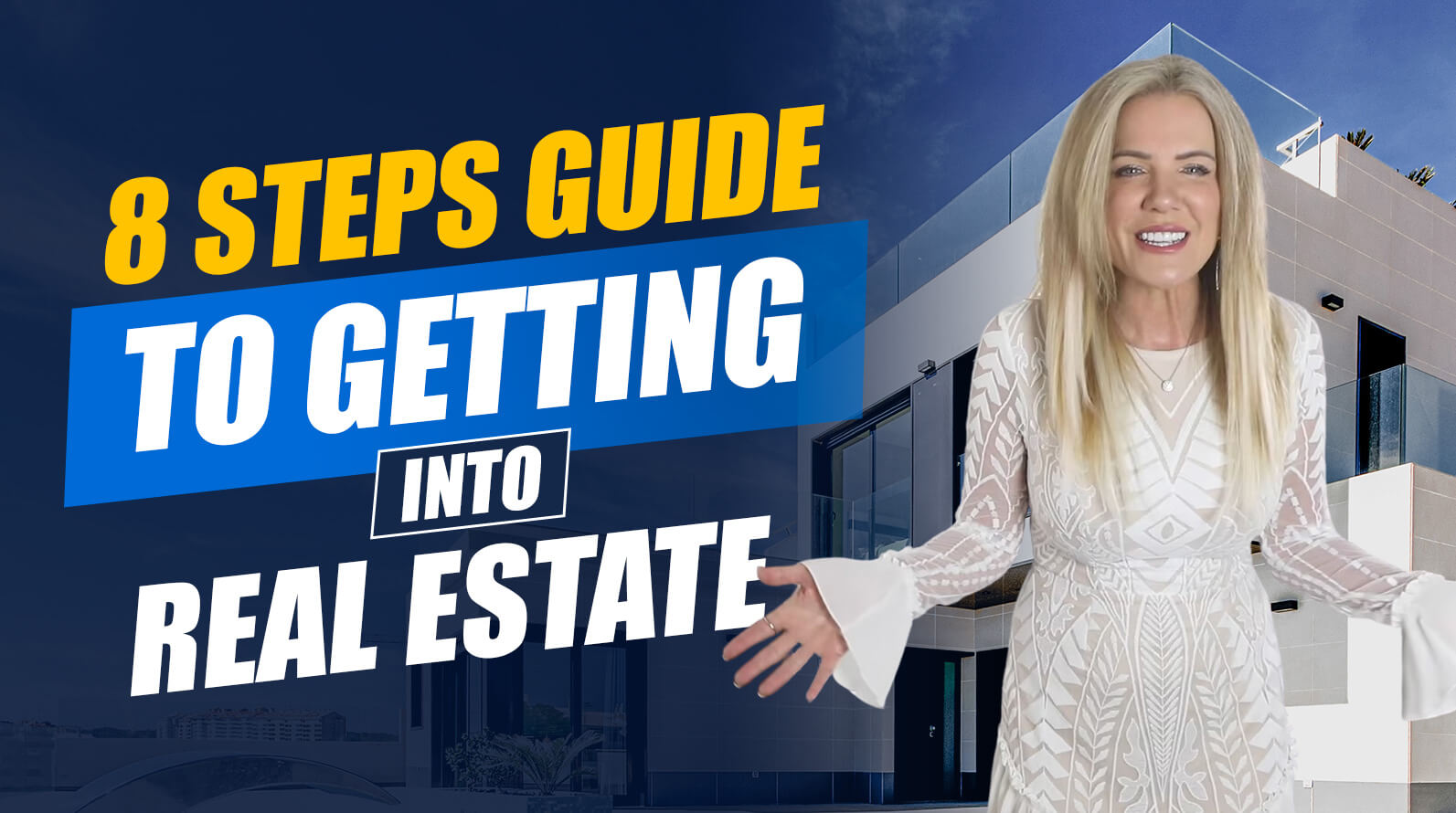If you’re curious about what it’s like to be a real estate agent, the truth is it’s a great profession with many opportunities to make a good amount of income.
Getting started is easy, but it is competitive. So, to be successful requires you to put in the work, understand your local market, and position yourself as the go-to for all things real estate related.
Why Become a Real Estate Agent?
Real estate is a lucrative career choice and rewarding in other ways. One of the advantages of working in real estate is that it offers a great deal of variety in your workday.
You can work with different clients, visit many different homes, and learn about the market daily. Your job will always change, and you won’t be doing the same thing every day.
In most cases, you also get to be your own boss while helping people achieve a piece of the American Dream as buyers and sellers navigate one of life’s significant milestones.
Talk about lucrative. According to data from the U.S. Bureau of Labor Statistics, the median pay for a real estate agent is about $48,340 per year.
And if you did additional education, testing, and experience, the average real estate broker takes home an average of $62,010, while top performers earn $100,000 or more per year.
- How To Get into Real Estate
Once you’re ready to get started in a career as a real estate agent, it’s pretty easy. Most of the time, being a real estate agent doesn’t require a college degree or taking expensive classes.
All you need to do is check with your state’s regulatory agency about the requirements to get a real estate license, sign up for some accredited classes, and pass the state exam.
Keep in mind that there is no national real estate license, so you must meet your state’s unique licensing requirements.
Do some research on your state’s real estate regulatory office website, which you can find by visiting the Association of Real Estate License Law Officials (ARELLO)’s regulatory agency directory.
Depending on where you live, you will have criteria and specific requirements to be a real estate agent in that state. They will provide you with guidelines for:
- Your age
- Education requirements (such as a high school diploma or GED)
- Pre Licensing courses and post-licensing requirements
- Exams and exam eligibility
- Application process and fees
- Background checks and fingerprinting
- Reporting any criminal history
- Continuing education
- How to achieve the next level of licensing
Once you have the basic requirements understood, the next thing you want to do is ask around. Check with friends and family that may be in the real estate business about their career to be sure that it is something you want to pursue.
Gain Experience by Working With Brokerages
Before you dive head-first into the pool, another trick you can consider is to work with a broker or join an agent’s team as an assistant.
Typically, brokers like agents to have previous experience, so having prior knowledge of the business or certifications from various courses could make the difference when applying to firms run by experienced individuals.
Working for a brokerage before you’re licensed is a way to meet other agents who can mentor you once you get started. By finding a mentor, you’ll gain valuable insights from their experiences that can help you learn how to jump-start your career.
Also, working for a brokerage lets you have an inside look at what a broker may be looking for in their agents, as well as the potential to gain valuable training that will help you learn the ropes quickly and affordably.
Finally, by working at a brokerage before you have your license, you have an inside track with the broker so that once you gain your license, you will know who the key people in the office will help you when it’s time.
- Find A Real Estate Exam Course

Once you’ve researched what it will be like as a real estate agent, check out your state’s regulatory website and find an accredited course to prepare you for your state licensing exam.
Most courses will require 100+ hours of instruction, and some can be taken online, in-person, or with hybrid options.
You want a course to prepare you for the exam and what to expect as a new salesperson. Also, your class will teach you professional ethics and prepare you for your obligation as a fiduciary, which is that you are required to act in your client’s best interest at all times.
When looking for the right course to take, ask around for a referral, conduct a google search, and check for reviews for the class you’re choosing, and once you’re settled on a particular one, sign up to get started.
- Sign Up And Take the Licensing Exam
After you complete your course, your instructor should explain how you can schedule, register for, and pay to take your state’s licensing exam.
Generally, you can expect to pay between $100-$300 to take the exam.
These exams are computerized. You’ll need to take them in person, and they will consist of two parts.
The first portion is on general real estate principles and practices that are nationally required, while the second is a more state-specific section that covers real estate laws in your state.
When taking the test, be prepared to be in a classroom setting for a few hours without a bathroom break or water break.
These exams are in a multiple-choice format, with the total number of questions and time allotted for the exam varying state by state.
Each of the two sections is scored separately, and you must receive a passing grade (typically 70%) on both sections to pass.
Remember that if you fail one or both sections, you’ll fail the test, but you’ll be allowed to retake the exam.
Every state is different regarding how many times you can retake the exam, how long you must wait before retaking, and if there are any deadlines to meet in order to be compliant, so check with your state’s regulatory agency.
- Pay Your Dues And Fees

Once you pass your exam, you must join a local real estate board and MLS to get started.
Typically your local board will charge you dues for membership, which will come with various benefits from continuing education, networking opportunities, and other support materials to help you get started and grow in your new career.
Additionally, they will ask you what brokerage you’ll be “hanging” your license with and will provide you a list of all the affiliated brokerages you can consider interviewing and joining.
Finally, you’ll need to join your local MLS, which is crucial for your success as a real estate agent. The MLS, or multiple listing service, is a database of all the homes under contract that are listed in your area. You’ll need access to the MLS to see what’s on the market currently and what’s coming soon.
The MLS is also the place you’ll advertise your own listings for other agents to share with their clients.
- Find A Real Estate Brokerage
Once you’ve gotten your license, paid your dues, and joined your local real estate board, the next step is to interview a few brokerages and select the one that fits you best.
When you’re interviewing various brokers, you want to look beyond just your commission split. FYI, as a new agent, 70/30 is a standard commission split between the agent and the broker, so the commission split shouldn’t be a game changer.
What To Look For In A Broker
During your interview with your potential broker, you’re looking for things that they do to support their agents and help those agents with their business.
You want to know what type of marketing and lead generation they may offer, any continuing education opportunities they may have, and what type of support they provide for their agents.
Obviously, the better well-known the brokerage, the better off the agent is with marketing. Still, it’s easy to be lost as just a number in a large brokerage, so a boutique agency may be better as you start and begin to build your brand.
There are a few basic things that you want to ask your broker in the initial interview, including;
- Broker split
- Support network and services for agents
- Lead generation and marketing
- Continuing education
- Office and desk assignment responsibilities
- Set Your Budget

Once you’ve decided on your brokerage, now is the time to create a budget for your business and your personal life.
When starting out, you’ll want to set two budgets, one for your personal life and one for your growing business.
In your personal life, things happen. For example, personal emergencies occur, child care costs, cars break down, things at home break and need to be replaced, rent and mortgages are due, etc.
Establishing an emergency fund helps prevent unexpected surprises from wreaking havoc on your personal budget. You should put aside 10% of every paycheck that can be tapped into only when necessary.
For your career in real estate, you need to treat it as a startup business that is on a shoestring budget.
As you’re working on commission, you won’t see a paycheck until you close your first transactions, so you’ll need to have either some money saved prior to starting your career, you’ll need a secondary source of income until your first transactions, or you have some support at home.
For your business, you’ll need to budget;
- Dues and fees, including brokerage fees, if any
- Continuing education costs
- Your marketing budget
- Rental space and startup costs (if necessary)
- Accounting and bookkeeping costs
- Determine Your Business Expenses and Revenue Goals
- Identify Fixed Costs
- Estimate Variable Costs
- Create Consistent Monthly Budgets
- Allocate Excess Funds Towards Savings and Follow Up Regularly
Creating a business budget is essential for real estate agents to maximize their income, keep costs low, and make ends meet.
Knowing how much money you need every month and throughout the year to cover your business’s expenses will keep you on the path toward financial success.
Developing a budget allows you to plan and strategize how to grow your business best to create a successful brand that will support you and your dreams. A good budget will also show you where your expenses are and whether there are areas you can scale back to save money.
- Make A Business Plan
As you’re starting in real estate, making a business plan is crucial for you to be able to stay on track and meet your goals. You want to make a comprehensive business plan but give some room to be flexible as you start.
The purpose of a business plan is to outline objectives and short-term goals an agent needs to reach to be successful.
Here are some key ingredients in your business plan to help you become a success:
Understand Your Local Real Estate Market
Every day you should look at the MLS and various apps to better understand the local market trends. By knowing these trends, you’re better situated to help your clients, making it easier for you to develop a marketing strategy and create a profitable plan.
Decide On Your Business Model
Are you going to be a listing agent, a buyers agent, working with investors, or focusing on property management?
What type of services do you want to provide and brand yourself as is an important part of your plan.
Design Realistic Goals And Objectives
Decide what you want your goals to be in the short and long term. To decide what is achievable and realistic for you starting out, talk to a mentor and consider hiring a real estate coach to help you map out your goals and to create objectives that will help you achieve them.
Create Your Financial Plan
Finally, outline your financial plan and budget. This step is important for you to know what you want to achieve, what plans are in place, and the expenses involved in getting there. Include in your plan the projections for income and expenses based on the total amount of transactions you plan to execute and what you anticipate as monthly costs associated with operating your business.
- Develop A Marketing Plan
Marketing is the most important component of your plan to grow your brand as a new real estate agent. If people don’t know who you are and what services you offer, it’s difficult for them to think of you when it comes time for them to make a real estate decision.
The key in your marketing plan is to be front-of-mind, that is, the person that comes to mind whenever someone thinks about their (or someone they know) real estate needs.
Developing an effective real estate marketing plan is the key to success in a highly competitive industry.
Here are some tips on how to get started:
- Identify your ideal client
- Check out the competition
- Define what makes you unique
- Refine your message
- Decide the best type of content to create
- Establish your budget
- Create a creative and publishing calendar
Here’s where working with a mentor and coach can help you dramatically. A coach and mentor will help you outline the best processes to craft, publish, and share your marketing for the best impact and reach.
When developing your real estate marketing plan, ensure that your strategies are well-defined from the start to prevent wasting time and money to get the best return for your efforts.
Since you’re starting out, being able to market your services and build your brand without spending too much money is crucial to staying within your budget.
Sphere Of Influence And Community Networking
One of the easiest and cheapest marketing tools you have at your disposal is to use your sphere of influence to get your messages out. Your sphere is the group of people you know, interact with, and trust you.
These people can be family, friends, colleagues, and past clients.
Another win-win for you is to be involved in your community, where you have an opportunity to interact and network with others to get the message out about your services.
You can join community organizations, sponsor youth activities, or find another way to give back to your community and highlight your services without being pushy.
Social Media
Social media is a gold mine for real estate agents if done correctly. You don’t need to spend much money on advertising to succeed. Instead, you want to be interactive and engaging on social media without trying to sell yourself.
Using social media regularly to highlight you within the community and the types of success stories you have carried more weight than paying for ads. But keep in mind the 1/10 rule when posting on social media.
The 1/10 rule is that for every business-related post, include 9 others so that you’re only posting business-type posts 1 out of every 10.
Video
While social media can get your message out to a large swath of people, the video gets a higher engagement than any other thing you can do. So as a strategy, send out 10 video texts daily to people within your sphere.
When using video, don’t sell yourself. Simply send out a hello video and make it personal. For example, you may send a birthday wish, celebrate a life event, or simply a, “Hey, I’ve been thinking about you.”
Being personable and having other channels like social media remind people of your services is a good strategy to utilize in growing your brand.
When you’re starting out in real estate, there are many things you need to consider, from getting licensed to building your brand. But, like most new businesses, there are things you won’t even know until you have to experience them.
Create a budget, set some goals, and get a mentor and coach to help accelerate your learning curve and to help you avoid typical pitfalls that could end up costing you a ton of time and money.
Finally, don’t overlook your network and connections as a source of referrals and possible leads either. People that know and trust you are great resources to pull from as you try to build your brand.




